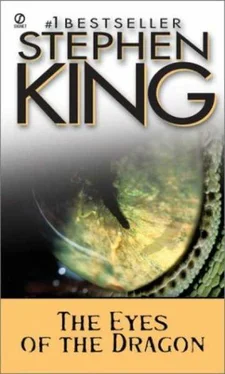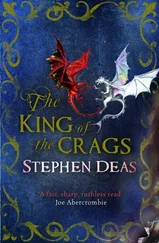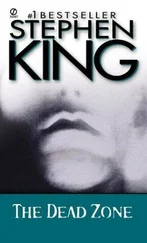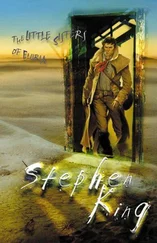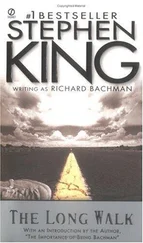Stephen King - The Eyes of the Dragon
Здесь есть возможность читать онлайн «Stephen King - The Eyes of the Dragon» весь текст электронной книги совершенно бесплатно (целиком полную версию без сокращений). В некоторых случаях можно слушать аудио, скачать через торрент в формате fb2 и присутствует краткое содержание. Год выпуска: 1987, Жанр: Фантастика и фэнтези, на английском языке. Описание произведения, (предисловие) а так же отзывы посетителей доступны на портале библиотеки ЛибКат.
- Название:The Eyes of the Dragon
- Автор:
- Жанр:
- Год:1987
- ISBN:нет данных
- Рейтинг книги:4 / 5. Голосов: 1
-
Избранное:Добавить в избранное
- Отзывы:
-
Ваша оценка:
- 80
- 1
- 2
- 3
- 4
- 5
The Eyes of the Dragon: краткое содержание, описание и аннотация
Предлагаем к чтению аннотацию, описание, краткое содержание или предисловие (зависит от того, что написал сам автор книги «The Eyes of the Dragon»). Если вы не нашли необходимую информацию о книге — напишите в комментариях, мы постараемся отыскать её.
The Eyes of the Dragon — читать онлайн бесплатно полную книгу (весь текст) целиком
Ниже представлен текст книги, разбитый по страницам. Система сохранения места последней прочитанной страницы, позволяет с удобством читать онлайн бесплатно книгу «The Eyes of the Dragon», без необходимости каждый раз заново искать на чём Вы остановились. Поставьте закладку, и сможете в любой момент перейти на страницу, на которой закончили чтение.
Интервал:
Закладка:
But how am I to tell you about Peter’s endless, drudging work at that tiny loom? That tale is beyond me. All the hours spent, sometimes with frosty breath pluming from his mouth and nose, sometimes with sweat running down his face, always in fear of discovery; all those long hours alone, with nothing but long thoughts and almost absurd hopes to fill them. I can tell you some things, and will, but to convey such hours and days of slow time is impossible for me, and might be impossible for anyone except one of the great storytellers whose race is long vanished. Perhaps the only thing that even vaguely suggests how much time Peter spent in those two rooms was his beard. When he came in, it was only a shadow on his cheeks and a smudge under his nose-a boy’s beard. In the 1,825 days which followed, it grew long and luxuriant; by the end it reached the middle of his chest, and although he was only twenty-one, it was shot with gray. The only place it did not grow was along the length of the jagged scar left by Beson’s thumbnail.
Peter dared pluck only five threads from each napkin the first year-fifteen threads each day. He kept them under his mattress, and at the end of each week, he had one hundred and five. In our measure, each thread was about twenty inches long.
He wove the first batch a week after he received the dollhouse, working carefully with the loom. Using it was not as easy at seventeen as it had been at five. His fingers had grown; the loom had not. Also, he was horribly nervous. If one of the warders caught him at his work, he could tell them he was using the loom to weave errant threads from the old napkins for his own amusement… if they believed it. And if the loom worked. He wasn’t sure that it would until he saw the first slim cable, per-fectly woven, emerging from the loom’s far end. When Peter saw this, his nervousness abated somewhat and he was able to weave a little faster, feeding the threads in, tugging them to keep them straight, operating the foot pedal with his thumb. The loom squeaked a little at first, but the old grease soon limbered up and it ran as perfectly as it had in his childhood.
But the cable was terribly thin, not even a quarter of an inch through the center. Peter tied off the ends and tugged experi-mentally. It held. He was a little encouraged. It was stronger than it looked, and he thought it should be strong. They were royal napkins, after all, woven from the finest cotton thread in the land, and he had woven tightly. He pulled harder, trying to guess how many pounds of strain he was putting on the slim cotton cable.
He pulled even harder, the rope still held, and he felt more hope come stealing into his heart. He found himself thinking about Yosef.
It had been Yosef, head of the stables, who told him about that mysterious and terrible thing called “breaking strain.” It was high summer, and they had been watching huge Anduan oxen pull stone blocks for the plaza of the new market. A sweat-ing, cursing drover sat astride each ox’s neck. Peter had then been no more than eleven, and he thought it better than a circus. Yosef pointed out that each ox wore a heavy leather harness. The chains that pulled the dressed blocks of stone were attached to the harness, one on each side of the animal’s neck. Yosef told him the cutters had to make a careful estimate of just how much each block of stone weighed.
“Because if the blocks are too heavy, the oxen might hurt themselves trying to pull them,” Peter said. This wasn’t even a question, because it seemed obvious to him. He felt sorry for the oxen, dragging those great blocks of rock.
“Nay,” Yosef said. He lit a cigarette made of cornshuck, al-most burning off the end of his nose, and drew deeply and contentedly. He always liked the young prince’s company. “Nay! Oxen aren’t stupid-people only think them so because they are large and tame and helpful. Says more about the people than about the oxen, if you ask me, but leave that b'hind, leave that b'hind.
“If an ox can pull a block, he’ll pull it; if he can’t, why, he’ll try twice and then stand with ’is head down. And he’ll stand so, even if a bad master whups his hide to ribbons. Oxen look stupid, but they ain’t. Not a bit.”
“Then why do the cutters have to guess at the weight of the blocks they cut, if the ox knows what he can pull and what he can’t?”
“T'ain’t the blocks; it’s the chains.” Yosef pointed to one of the oxen, which was dragging a block that looked to Peter almost as big as a small house. The ox’s head was down, its eyes fixed patiently ahead, as its drover sat astride it and guided it with little taps of his stick. At the end of the double length of chain, the block moved slowly along, goring a furrow in the earth. It was so deep that a small child would need to work to climb out of it. “If an ox can pull a block, he will, but an ox don’t know nothing about chains, or about the breaking strain.”
“What’s that?”
“Put a thing under enough of a tug, and it’ll snap,” Yosef said. “If yonder chains were to snap, they’d fly around something turrible. You wouldn’t want to be a witness to what can happen if a heavy chain lets go when it’s under such a tug as those oxen can put on. It’s apt to fly anywhere. Back'rds, mostly. Apt to hit the drover and tear him apart, or cut the legs from under the beast itself.”
Yosef took another drag at his makeshift cigarette and then tossed it in the dirt. He fixed Peter with a shrewd, friendly glare.
“Breaking strain,” he said, “is a good thing for a prince to know about, Peter. Chains break if you put on enough of a tug, and people do, too. Keep it in mind.”
He kept it in mind now, as he pulled at his first cable. How much of a “tug” was he putting on? Five rull? At least. Ten? Perhaps. But maybe that was only wishful thinking. He would say eight. No, seven. Better to make a mistake on the pessimistic side, if a mistake was to be made. If he miscalculated… well, the cobblestones in the Plaza of the Needle were very, very hard.
He tugged harder still, the muscles on his arms now beginning to stand out a little. When the first cable finally snapped, Peter guessed he might be applying as much as fifteen roll-almost sixty-four pounds-of tug.
He was not unhappy with this result.
Later that night, he threw the broken cable out of his window, where the men who cleaned the Plaza of the Needle daily would sweep it up with the rest of the rubbish the following day.
Peter’s mother, seeing his interest in the dollhouse and the little furnishings inside, had taught him how to weave cables and braid them into tiny rugs. When we have not done a thing for a long period, we are apt to forget exactly how that thing was done, but Peter had nothing but time, and after some ex-perimentation, the trick of braiding came back to him.
“Braiding” was what his mother had called it and so that was how he thought of it, but braiding was not really the right word for it; a braid, precisely speaking, is the hand-weaving of two cables. Wrapping, which is how rugs are made, is the hand-weaving of three or more cables. In wrapping, two cables are placed apart, but with their tops and bottoms even. The third is placed between them, but lower, so its end sticks out. This pattern is carried on as length after length is added. The result looks a little bit like Chinese finger-pullers… or the braided rugs in your favorite grandmother’s house.
It took Peter three weeks to save enough threads to try this technique, and most of a fourth to remember exactly how the over-and-under pattern of wrapping had gone. But when he was done, he had a real rope. It was thin, and you would have thought him mad to entrust his weight to it, but it was much stronger than it looked. He found he could break it, but only by wrapping its ends firmly around his hands and pulling until the muscles bulged on his arms and chest and the cords stood out on his neck.
Читать дальшеИнтервал:
Закладка:
Похожие книги на «The Eyes of the Dragon»
Представляем Вашему вниманию похожие книги на «The Eyes of the Dragon» списком для выбора. Мы отобрали схожую по названию и смыслу литературу в надежде предоставить читателям больше вариантов отыскать новые, интересные, ещё непрочитанные произведения.
Обсуждение, отзывы о книге «The Eyes of the Dragon» и просто собственные мнения читателей. Оставьте ваши комментарии, напишите, что Вы думаете о произведении, его смысле или главных героях. Укажите что конкретно понравилось, а что нет, и почему Вы так считаете.
